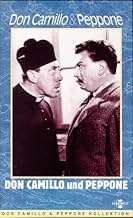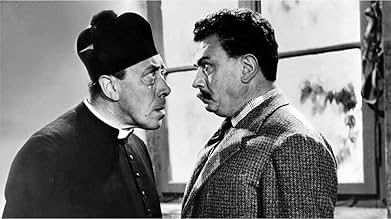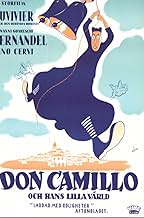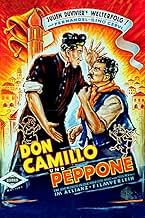VALUTAZIONE IMDb
7,6/10
5087
LA TUA VALUTAZIONE
Un prete determinato e un sindaco comunista sviluppano un'amicizia riluttante nonostante la loro rivalità ufficiale.Un prete determinato e un sindaco comunista sviluppano un'amicizia riluttante nonostante la loro rivalità ufficiale.Un prete determinato e un sindaco comunista sviluppano un'amicizia riluttante nonostante la loro rivalità ufficiale.
- Regia
- Sceneggiatura
- Star
- Nominato ai 1 BAFTA Award
- 3 vittorie e 3 candidature totali
Vera Talchi
- Gina Filotti
- (as Vera Talqui)
Charles Vissières
- Il Vescovo
- (as Charles Vissiere)
Clara Auteri Pepe
- Woman saying 'Viva Peppone!'
- (as Clara Auteri)
Manuel Gary
- Il delegato
- (as Manoel Gary)
Recensioni in evidenza
In 1948 the Italian journalist and novelist Giovannino Guareschi wrote: Mondo piccolo : Don Camillo (translated in French en 1951 in Le petit monde de Don Camillo).Giovannino Guareschi creates in this book two strong characters: Don Camillo, the priest of Brescella and Giuseppe "Peppone" Bottazzi ,the communist mayor of Brescella.In 1952 French and Italian producers ask the French director Julien Duvivier to direct the "The little world of Don Camillo" with Fernandel and Gino Cervi as main actors.
Julien Duvivier is a French director well know by "Sous le ciel de Paris", "Marie-Octobre" and "The Devil and the Ten commandments".
Fernandel and Gino Cervi don't need any presentation, there were well known actors in their respective countries.
"Don Camillo" is then the story of the rivalry between Don Camillo and Peppone.The two men have fought together in the Italian resistance and now one is the priest of the village and the other one is mayor of the village.We are in the time of the cold war: in Italy there are now two important political parties who dominate the political life in the country and also in this village of the Po Valley.Don Camillo criticizes Peppone and Peppone criticizes Don Camillo.Every one is thinking in the next moves that he can do to annoy the other one,but also, they will help each other in the difficult moments of their lives.I forget to mention an important character of this film ,the narrator who tells quietly and with humour the rivalry betweeen Don Camillo and Peppone.
...Actually, of all those adjectives, `Italian' was the first to leap to mind. I can't believe the IMDb has decided to classify this film under a French name. `Things happen there that could happen nowhere else in the world,' says the narrator. It's easy to believe.
The Catholics and the communists are battling for the soul of a small village. It's to be hoped that neither side ever wins. Nor is it likely that either side ever will win. This would spoil everyone's fun.
The communist mayor, is, so to speak, the Anglican of the two: someone who will gruffly talk about burning all the capitalists, while letting it be understood that he doesn't really intend his words to be taken literally. The priest (Don Camillo) is hot-headed, as fiercely loyal to the Catholic Church as the mayor is to his party, at once highly intelligent and preternaturally simple minded. He's the kind of Catholic who avoids absurdity by the time-honoured trick of simply not thinking about the doctrines to which he officially subscribes. His `prayers' are impromptu conversations with Jesus, or perhaps simply with the icon of Jesus that hangs on his wall - whichever it is, the film humours his fancy by having Jesus (or the icon) talk back to him. To this day I'm not sure if Jesus (or the icon) is REALLY talking back, or if it's just Don Camillo's imagination. What does it matter? It is, after all, no more than a private eccentricity. It's not as if he talks to or about Jesus in PUBLIC.
No one - not atheists, not communists, not Christians, not Norse pagans - could object to the film's big-hearted fantasy, or fail to like either of the two very likeable protagonists. I gather there are several sequels: the one I've seen isn't nearly as good; and the original feels so much like an archetype that I suspect any sequel would be little more than a footnote.
The Catholics and the communists are battling for the soul of a small village. It's to be hoped that neither side ever wins. Nor is it likely that either side ever will win. This would spoil everyone's fun.
The communist mayor, is, so to speak, the Anglican of the two: someone who will gruffly talk about burning all the capitalists, while letting it be understood that he doesn't really intend his words to be taken literally. The priest (Don Camillo) is hot-headed, as fiercely loyal to the Catholic Church as the mayor is to his party, at once highly intelligent and preternaturally simple minded. He's the kind of Catholic who avoids absurdity by the time-honoured trick of simply not thinking about the doctrines to which he officially subscribes. His `prayers' are impromptu conversations with Jesus, or perhaps simply with the icon of Jesus that hangs on his wall - whichever it is, the film humours his fancy by having Jesus (or the icon) talk back to him. To this day I'm not sure if Jesus (or the icon) is REALLY talking back, or if it's just Don Camillo's imagination. What does it matter? It is, after all, no more than a private eccentricity. It's not as if he talks to or about Jesus in PUBLIC.
No one - not atheists, not communists, not Christians, not Norse pagans - could object to the film's big-hearted fantasy, or fail to like either of the two very likeable protagonists. I gather there are several sequels: the one I've seen isn't nearly as good; and the original feels so much like an archetype that I suspect any sequel would be little more than a footnote.
Fernandel is Don Camillio, the reactionary village priest. Gino Cervi is Giuseppe 'Peppone' Bottazzi, the communist mayor and the fierce opponent of of Camillio. In their own little world, they engage in a fierce and time-honored struggle for the hearts, minds, souls and well-being of their community. Cervi has his organization and supporters. Camillio only only the voice of G*d to narrate the events and to reproach him when he fails in his work; however, since it's Orson Welles' voice, the honors are more than even in this loving little film by Julien Duvivier.
It's an odd film from Duvivier, whose movies often celebrated the unseen hand of fate, leading men to destruction. Yet in this movie, everyone knows who they are and what is important, even if they disagree fiercely. So the old teacher rails against stupidity and hopes for a pension; the young lovers re-enact Romeo and Juliet; and the communist brings his newborn child to be baptized as Giuseppi Stalin.
Perhaps it is the inherent humility of these people that makes Duvivier adore them. They do not fight their fates, but recognizing it, do their best within it. Duvivier made a sequel, and Fernandel repeated the role four times, his lugubrious face making him the perfect parish priest.
It's an odd film from Duvivier, whose movies often celebrated the unseen hand of fate, leading men to destruction. Yet in this movie, everyone knows who they are and what is important, even if they disagree fiercely. So the old teacher rails against stupidity and hopes for a pension; the young lovers re-enact Romeo and Juliet; and the communist brings his newborn child to be baptized as Giuseppi Stalin.
Perhaps it is the inherent humility of these people that makes Duvivier adore them. They do not fight their fates, but recognizing it, do their best within it. Duvivier made a sequel, and Fernandel repeated the role four times, his lugubrious face making him the perfect parish priest.
French comic actor Fernandel embodied the title role while remarkable Italian character actor Gino Cervi played his spiritual and political opponent. More than a rustic comedy, the film epitomizes the postwar political polarization in Italy and symbolizes the famous "compromesso storico"---historical compromise---under which Italy would long continue to be governed. This successful film spawned a series of popular sequels, mostly with the same two actors, all based on the Giovanni Guareschi novels. A point of clarification: this was a French-Italian co-production and was first released in the U.S. in its French-language version with English subtitles before the dubbed English version with narrator Orson Welles went into circulation. The Italian-language version, not readily available, is the most appropriate one.
This is, and has been since I was a young boy, one of my favorite movies.
It's the story of a Catholic priest and a Communist mayor who are each others worst enemy and best friend. The dialogs are just great, but what I like most about these movies (there a are 5 in total) is that both main characters (Don Camillo and Peppone) are "real people". They act on impulse, say one thing but think the other, manipulate... they are real humans. When one of Peppone's people dies and asks for the church-bells to be rang at his funeral, Don Camillo refuses because he was no Catholic. Peppone orders a big bell to be placed in the town square which Don Camillo sabotages. The bell is broken and sounds horrible but at the end, Don Camillo rings his bells because "by asking for the bells, the boy was asking for God". This is one of these typical things I like about these movies.
I've got the good fortune I also understand French and can watch these movies in that language. I can't imagine what they would sound like in English but I would advice anyone to watch them in the French version. I hate dubbed movies and can't imagine Fernandel speaking English (although in one movie he does which is hilarious). But in all, I think even the English version still is one of the best movies ever made.
If you're not prejudiced against black and white and foreign movies, this is a movie you have to see. If you are, you don't know what you're missing.
It's the story of a Catholic priest and a Communist mayor who are each others worst enemy and best friend. The dialogs are just great, but what I like most about these movies (there a are 5 in total) is that both main characters (Don Camillo and Peppone) are "real people". They act on impulse, say one thing but think the other, manipulate... they are real humans. When one of Peppone's people dies and asks for the church-bells to be rang at his funeral, Don Camillo refuses because he was no Catholic. Peppone orders a big bell to be placed in the town square which Don Camillo sabotages. The bell is broken and sounds horrible but at the end, Don Camillo rings his bells because "by asking for the bells, the boy was asking for God". This is one of these typical things I like about these movies.
I've got the good fortune I also understand French and can watch these movies in that language. I can't imagine what they would sound like in English but I would advice anyone to watch them in the French version. I hate dubbed movies and can't imagine Fernandel speaking English (although in one movie he does which is hilarious). But in all, I think even the English version still is one of the best movies ever made.
If you're not prejudiced against black and white and foreign movies, this is a movie you have to see. If you are, you don't know what you're missing.
Lo sapevi?
- QuizThe whole film was shot twice; there is a French and an Italien negative, that can be distinguished by details in editing and content (watch the position of the dog during the procession for example).
- Citazioni
Crocefisso: Where did you get that cigar, Camillo?
Don Camillo: Peppone had two. I think I took it without asking him. You know he believes in equal distribution of wealth.
- Versioni alternativeGerman version runs 2 minutes shorter than the Italian original version.
- ConnessioniFeatured in Cinema forever - Capolavori salvati (2001)
I più visti
Accedi per valutare e creare un elenco di titoli salvati per ottenere consigli personalizzati
- How long is The Little World of Don Camillo?Powered by Alexa
Dettagli
- Data di uscita
- Paesi di origine
- Lingue
- Celebre anche come
- The Little World of Don Camillo
- Luoghi delle riprese
- Aziende produttrici
- Vedi altri crediti dell’azienda su IMDbPro
- Tempo di esecuzione
- 1h 36min(96 min)
- Colore
- Proporzioni
- 1.37 : 1
Contribuisci a questa pagina
Suggerisci una modifica o aggiungi i contenuti mancanti

























